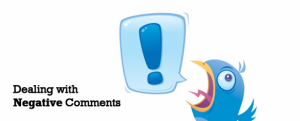10 Big Fat Social Media Mistakes That Cripple Your Brand’s Reputation
Social media is a great opportunity for small business owners looking to increase their visibility, reach, and leads. But, when it’s not used properly, it can actually harm your brand’s online reputation. Having an unsystematic social media strategy or no strategy at all can be a waste of time and resources. Not to mention that it could turn away prospects.
This article will walk you through ten social media mistakes that can damage your brand’s reputation.
- Not Responding to Negative Feedback
Negative feedback is inevitable. It will happen regardless of how amazing your product is or how much you strive to ensure great customer service. But, how you respond says a lot about your brand. You can choose to ignore it, fight back or please the unsatisfied customer.
Some small business owners believe that they can simply delete negative reviews without repercussions. Others think that ignoring negative feedback is an appropriate strategy. That couldn’t be further from the truth.
Ignoring or avoiding negative comments can only hurt your business. Rather than tuning out bad reviews, why not use them as an opportunity to show off your commitment to customer service.
- Buying Likes
Getting social media fans has become increasingly hard. However, this doesn’t mean that buying likes or followers is ever an acceptable practice. Besides the obvious point that bought fans will never interact or engage with your page like real ones, you can seriously cripple your online reputation if Facebook finds out about your scheme. You can find your account being closed, banned or even deleted
- Sounding Like a Despicable Salesman
You know what makes a salesman boring, pushy and tiresome? Talking about his products all the time, without considering his audience’s needs.
Social media is all about building relationships and trust that will eventually lead to sales. Don’t abuse these channels to push your marketing messages – it will only turn away prospects and hurt your reputation.
The “Shaq O’Neal” principle is a good rule of thumb: post engaging content 80% of the time, informative content 15% of the time, and promote your products no more than 5% of the time.
- Posting the Same Type of Content
Posting the same type of content over and over again can give the impression that your brand is boring or not interested in it’s audience needs. Rather than posting motivational quote after motivational quote, don’t be afraid to mix things up a bit.
- Having a One-Way Conversation
If all you’re ever doing on social media is talking about your products and your company, without engaging in conversation with users or other brands, it will start to sound like you are just talking to yourself.
Don’t be afraid to add your opinion to trending conversations to show your audience you’re not simply regurgitating news from the industry. Also, don’t be too proud to share posts from other companies to show you are a committed member of the community, not just a marketing machine.
And, last but not least, don’t forget to be social. If fans or followers are asking questions or mentioning your brand in a post, reply to show that you care about their needs, opinions, and interests. Being helpful and friendly can only benefit your online reputation.
- Being Inconsistent
How would you feel if, every now and then your favorite TV show would stop running just because the producers were too busy and they forgot to create a new episode? Or if the tone of the show changed because the writers decided to experiment with different styles? You wouldn’t be too happy about it, would you?
The same goes for your social media strategy. If you don’t have a strategy in place, it’s extremely hard to be consistent in your marketing message. Not to mention that not having a consistent brand voice for dealing with negative feedback can affect your online reputation.
Create guidelines for how to respond to bad reviews or frequently asked questions. Establish a posting schedule to ensure your brand is consistent in both, use and messaging.
- Cut and Paste Responses
Having some guidelines will help you respond to comments and questions in a consistent manner. But, the “cut and paste” method can only cripple your reputation.
While having automated response for frequently asked questions can save both, your and your customers’ time, using generic messages isn’t always the best way to go. Keep in mind that negative comments, specific questions, and criticism require personalized, thought-through feedback.
- Blending Personal and Business Messages
Surely you’re not just on Facebook and Twitter. You are active on different other social media platforms like Pinterest, Instagram, LinkedIn, Vine, YouTube, and so on. Be very cautious because, with multiple social media accounts it’s fairly easy to get business and personal accounts mixed up.
One staff member from KitchenAid sent an offensive message about Obama’s grandmother during the political debates of 2012. As it turned out, the employee thought he was logged into his personal accounts. These types of mistakes can seriously harm your reputation and your business.
- Offending Clients
Sometimes the things that go through your mind shouldn’t go out your fingers, especially if you are a social media manager or a business owner. Take, for example, one of the vice presidents for the ad agency Ketchum. He tweeted that he would rather die than having to live in Memphis. As it turns out, Memphis was the headquarters for FedEx, which just happened to be the agency’s biggest client. Needless to say, FedEx wasn’t pleased by the remark.
- Bad Timing
Most social media managers schedule their posts weeks in advance. But, when a crisis strikes, you should stop the updates. No one wants to see your latest update when you are in the middle of a reputation crisis.
Here’s an example: a bug in the system caused Southwest Airlines customers to be charged multiple times. While angry customers were taking to Facebook to express their frustration, a scheduled post created the impressions that the company has time to update its profile picture, but no time to answer customers.
Can social media help your small business? Definitely! But, just as social media can strengthen your online reputation, it can also cripple it. Avoid these ten mistakes to ensure your brand will not suffer.







Leave A Comment